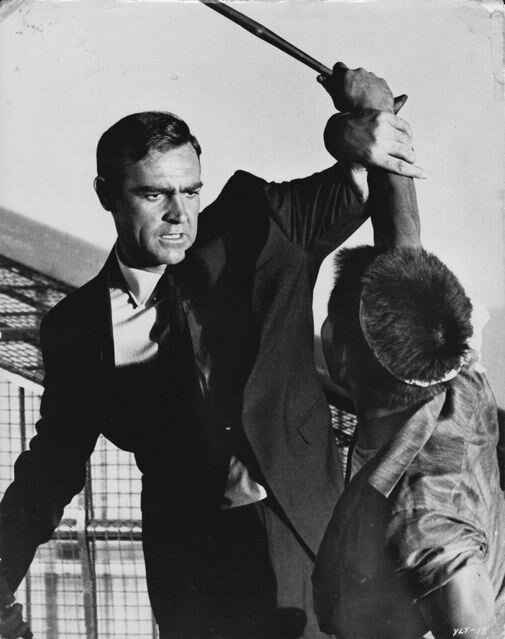You are hereJames Bond / James Bond 1
James Bond 1
007: His license to thrill replaced by gimmicks
By TOM SOTER
from THE COLUMBIA DAILY SPECTATOR
April 29, 1977
 Sean Connery in You Only Live Twice.
Sean Connery in You Only Live Twice.
Since the first James Bond film was released in 1962 there have been nine films chronicling his adventures. That's about five too many and is sadly indicative of the old saying "nothing succeeds like success" which must motivate Hollywood producers. In Bond's case, the success is still there, but the reasons for it have now become as obscure as some former presidents.
When Doctor No, the initial 007 movie appeared, it was moderately successful. From Russia With Love did much better and Goldfinger was a runaway success, becoming one of the fastest grossing films in history. When one sees it today, it is still remarkably fresh and entertaining and manages to make its successors seem shallow by comparison. It epitomizes all that is good and bad in Bond and, also, the reason why he finally had to fail.
In it, we· are given the fantasy-like violence that was to become a 007 trademark (beginning with a pre-credits mini-adventure involving Bond, heroin-flavored bananas, and a rubber duck) as well as menacingly unreal villains withnames like Auric Goldfinger and Pussy Galore. We are also presented with preposterous gadgetry, of which Bond's Aston Martin, the car that can do anything, is the best known example.
This mechanical versatility is what ultimately spelled the end for the series. Feeling that bigger must be better and that the best way to improve future films was to increase the gadgetry, later movies like Thunderball and Live and Let Die were literally buried in gimmicks, and. in the process, the two things that made Bond unique, that odd mixture of spoof and menace were lost.
In Goldfinger and From Russia With Love, the tension is created by inhuman villains that seem capable of beating 007. The mute Korean Oddjob with his steelrimmed, frisbee like hat, and the silently menacing Red Grant who hovers in and out of Bond's path like a ghost are dehumanized by their silence and thereby act as good foils to the super, but still human, secret agent.
And Bond kept that humanity, and our sympathy, by his ready wit and his unwillingness to take anything too seriously. He kept the dehumanization and the violence at a distance by his humor; we constantly knew it was make-believe and therefore could enjoy it.
Sean Connery was uniquely suited for his role. His thick Scottish agent seemed at variance with the David Niven-like hero Ian Fleming envisaged, and thus made him the perfect personification of the comic/serious duality of the series. It also helps explain why his successors, George Lazenby and Roger Moore, both touted as "more in the Fleming image" have been unsuccessful. Fleming's character is not very interesting. He is a somber figure who rarely sees the humor of his adventures. Connery could and because of that gave the series the focus it needed. 
Connery in Goldfinger.
Since his departure, however, the Bond films have become little more than assembly-line productions with audience programming being the primary concern. If a car chase worked well in one film, for instance, there will be three chases in the next one. This technique might be logical, but it is also tedious, making Bond films the victims of the very dehumanization which their hero had previously fought against. It has come to the point where anyone can make a Bond film as long as he knows what audience-reaction buttons to press.
Then why do people attend them? The simplest answer would be nostalgia for a time when the world could be broken down into stylish bad guys and good guys. The sad thing is that the Bond films don't even offer that anymore. They are no longer stylish and are now too predictable to offer any real escape.
Which is too bad, and anyone wanting to see what I mean, or hoping for a break from studying, can journey down to the Carnegie Hall Cinema on May 6th, when Goldfinger and Doctor No will be playing. If nothing else, they offer proofof how far we haven't come in Bond films since 1964.
